The OCZ Vertex 3 Review (120GB)
by Anand Lal Shimpi on April 6, 2011 6:32 PM ESTAnandTech Storage Bench 2011
I didn't expect to have to debut this so soon, but I've been working on updated benchmarks for 2011. Last year we introduced our AnandTech Storage Bench, a suite of benchmarks that took traces of real OS/application usage and played them back in a repeatable manner. I assembled the traces myself out of frustration with the majority of what we have today in terms of SSD benchmarks.
Although the AnandTech Storage Bench tests did a good job of characterizing SSD performance, they weren't stressful enough. All of the tests performed less than 10GB of reads/writes and typically involved only 4GB of writes specifically. That's not even enough exceed the spare area on most SSDs. Most canned SSD benchmarks don't even come close to writing a single gigabyte of data, but that doesn't mean that simply writing 4GB is acceptable.
Originally I kept the benchmarks short enough that they wouldn't be a burden to run (~30 minutes) but long enough that they were representative of what a power user might do with their system.
Not too long ago I tweeted that I had created what I referred to as the Mother of All SSD Benchmarks (MOASB). Rather than only writing 4GB of data to the drive, this benchmark writes 106.32GB. It's the load you'd put on a drive after nearly two weeks of constant usage. And it takes a *long* time to run.
I'll be sharing the full details of the benchmark in some upcoming SSD articles but here are some details:
1) The MOASB, officially called AnandTech Storage Bench 2011 - Heavy Workload, mainly focuses on the times when your I/O activity is the highest. There is a lot of downloading and application installing that happens during the course of this test. My thinking was that it's during application installs, file copies, downloading and multitasking with all of this that you can really notice performance differences between drives.
2) I tried to cover as many bases as possible with the software I incorporated into this test. There's a lot of photo editing in Photoshop, HTML editing in Dreamweaver, web browsing, game playing/level loading (Starcraft II & WoW are both a part of the test) as well as general use stuff (application installing, virus scanning). I included a large amount of email downloading, document creation and editing as well. To top it all off I even use Visual Studio 2008 to build Chromium during the test.
Update: As promised, some more details about our Heavy Workload for 2011.
The test has 2,168,893 read operations and 1,783,447 write operations. The IO breakdown is as follows:
| AnandTech Storage Bench 2011 - Heavy Workload IO Breakdown | ||||
| IO Size | % of Total | |||
| 4KB | 28% | |||
| 16KB | 10% | |||
| 32KB | 10% | |||
| 64KB | 4% | |||
Only 42% of all operations are sequential, the rest range from pseudo to fully random (with most falling in the pseudo-random category). Average queue depth is 4.625 IOs, with 59% of operations taking place in an IO queue of 1.
Many of you have asked for a better way to really characterize performance. Simply looking at IOPS doesn't really say much. As a result I'm going to be presenting Storage Bench 2011 data in a slightly different way. We'll have performance represented as Average MB/s, with higher numbers being better. At the same time I'll be reporting how long the SSD was busy while running this test. These disk busy graphs will show you exactly how much time was shaved off by using a faster drive vs. a slower one during the course of this test. Finally, I will also break out performance into reads, writes and combined. The reason I do this is to help balance out the fact that this test is unusually write intensive, which can often hide the benefits of a drive with good read performance.
There's also a new light workload for 2011. This is a far more reasonable, typical every day use case benchmark. Lots of web browsing, photo editing (but with a greater focus on photo consumption), video playback as well as some application installs and gaming. This test isn't nearly as write intensive as the MOASB but it's still multiple times more write intensive than what we were running last year.
As always I don't believe that these two benchmarks alone are enough to characterize the performance of a drive, but hopefully along with the rest of our tests they will help provide a better idea.
The testbed for Storage Bench 2011 has changed as well. We're now using a Sandy Bridge platform with full 6Gbps support for these tests. All of the older tests are still run on our X58 platform.
AnandTech Storage Bench 2011 - Heavy Workload
We'll start out by looking at average data rate throughout our new heavy workload test:
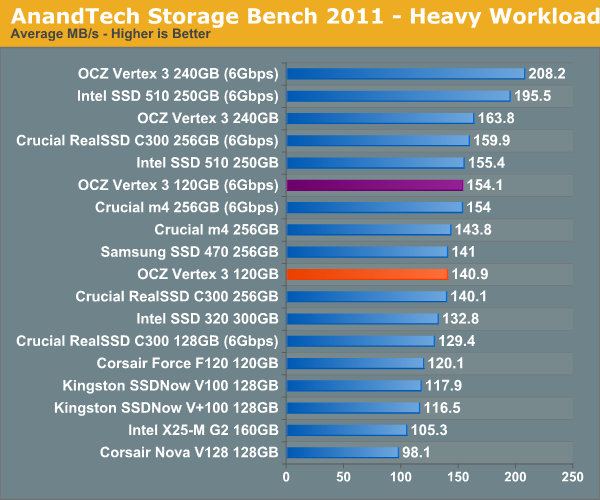
In our heavy test for 2011 the 120GB Vertex 3 is noticeably slower than the 240GB sample we tested a couple of months ago. Fewer available die are the primary explanation. We're still waiting on samples of the 120GB Intel SSD 320 and the Crucial m4 but it's looking like this round will be more competitive than we originally thought.
The breakdown of reads vs. writes tells us more of what's going on:
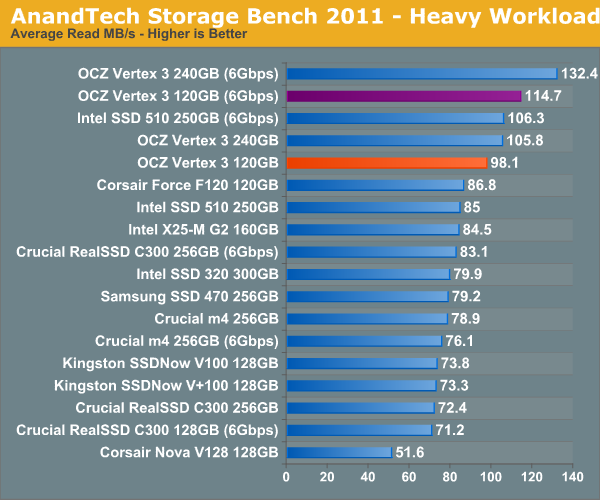
Surprisingly enough it's not read speed that holds the 120GB Vertex 3 back, it's ultimately the lower (incompressible) write speed:
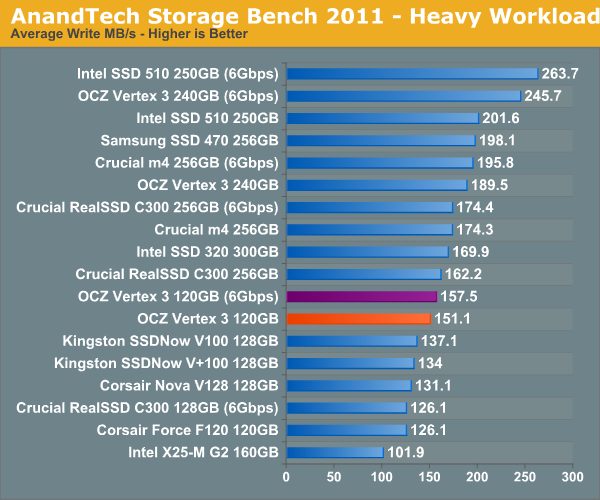
The next three charts just represent the same data, but in a different manner. Instead of looking at average data rate, we're looking at how long the disk was busy for during this entire test. Note that disk busy time excludes any and all idles, this is just how long the SSD was busy doing something:
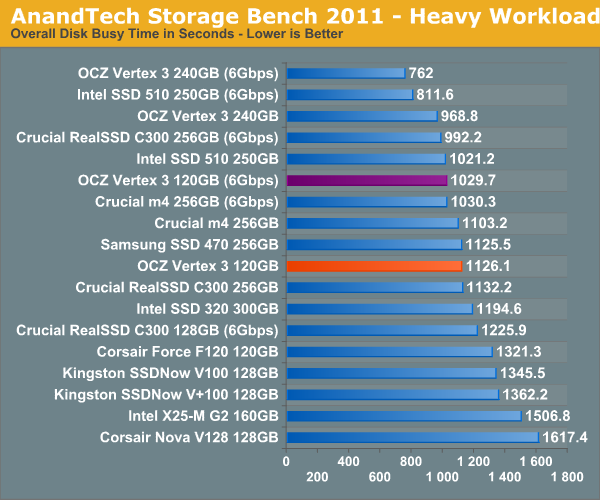
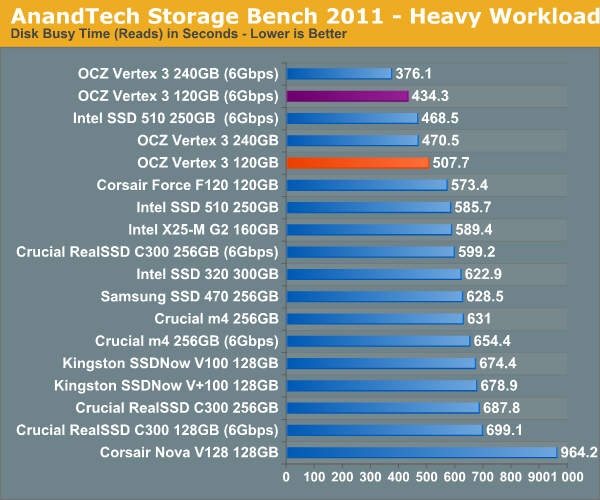
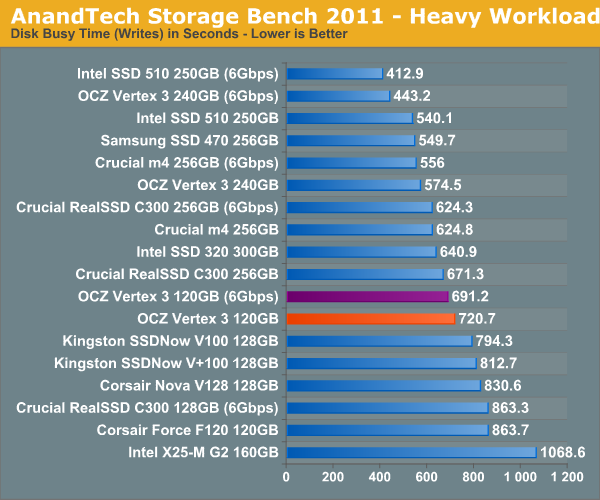










153 Comments
View All Comments
jharmon - Monday, May 2, 2011 - link
It's been almost a month since an update in the SSD world from Anandtech. Are there any reviews on the near horizon? You said one might want to wait for a purchase until you got some of the lower capacity drives in to test to compare with the vertex 3.Thanks for all your hard work in analysis, Anand!
jharmon - Monday, May 2, 2011 - link
Maybe also address the issue with the hardware limitation from the Marvell controllers 91xx. If I understand it correctly, these will be be able to achieve the 500 MB/s. If that performance cannot be achieved, is the vertex 3 worth the premium?mrkimrkonja - Wednesday, May 4, 2011 - link
From these SSD articles I learned that TRIM is very important with SSD.I read somewhere that when you use SSD in RAID you lose TRIM support and some other things.
Is this true?
I now have 2 old ADATA SSD generation 1 in RAID0 they have 2x the performance comparing to a single drive bud they do not have TRIM anyway.
I already bought one VERTEX 2 60GB and thought buying anther one.
Always thought better more smaller disks in RAID than one big one.
If this is true I an thinking I would lose more over time without TRIM support than gain with RAID0.
Can you hal me with some info or first hand tests?
Foochey - Wednesday, May 4, 2011 - link
I would be very interested to see how the 480GB stacks up to these drives. Since these are parallel processing devices, you would think that the 480 would perform even better than the 240. Anand, any way you can get a 480 and test it? OCZ's specs look the same, so I'm guessing that they are using the smaller die chips or doing something with the way they write to the array. Any ideas? Price certainly makes the 480 out of the question for most of us, but I sure would be interested in its performance.jeffburg - Thursday, May 26, 2011 - link
OCZ Just launched the Max IOPS Version. Is that worth the extra $10? Whats the difference between the two?Palen - Thursday, June 2, 2011 - link
Thank you for another great article.In the conclusion of this article it's advised to wait for a couple of weeks to see how the vertex 3 120 GB goes againts the other 3rd generation 120GB SSD's. Is there any indication that Anandtech will be recieving / testing any of these drives in the near future?
Another thing is RAID: I've been doing some digging on SSD's, since I didn't know much about them untill last week. The general picture is starting to make sence now. Bigger is ussually faster (within certain parameters). However i'm getting conflicting information about RAID. According to some it's worth it, while others urge to stay away from RAID (no TRIM support, etc). It would be nice to have a well respected opinion in the mass of conflicting information. How would for instance 2x 60 GB SSD's do against a same type/brand 120 GB SSD? and how does the raidcontroller fit into this equation? On-board vs. professional solution?
My gut says "stay away from raid!" because the SSD's allready scale in performance depending on their storagesize. Next to that the strain that an onboard controller will put on your CPU. And paying for a professional raidcard just seems silly, with the range of SSD PCIe storage solutions. But than again, what do I know?
paul-p - Saturday, October 22, 2011 - link
After 6 months of waiting for OCZ and Sandforce to fix their firmware from freezes and BSOD's, I can finally say it is fixed. No more freezes, no more BSOD's, performance is what is expected. And just to make sure all of the other suggestions were 100% a waste of time, I updated the firmware and DID NOT DO anything else except reboot my machine and magically everything became stable. So, after all these months of OCZ and Sandforce blaming everything under the sun including:The CMOS battery, OROM's, Intel Drivers, Intel Chipsets, Windows, LPM, Hotswap, and god knows what else, it turns out that none of those issues had anything to do with the real problem, which was the firmware.
While I'm happy that this bug is finally fixed, Sandforce and OCZ have irrepairably damaged their reputation for a lot of users on this forum.
Here is a list of terrible business practices that OCZ and Sandforce have done over the last year...
OCZ did not stand behind their product when it was clearly malfunctioning is horrible.
OCZ did not allow refunds KNOWING that the product is defective is ridiculous.
OCZ nor Sandforce even acknowledged that this was a problem and steadfastly maintained it only affected less than 1% of users.
The fact that OCZ claims this bug affected 1% of users is ridiculous. We now know it affected 100% of the drives out there. Most users just aren't aware enough to know why their computer froze or blue screened.
OCZ made their users beta test the firmwares to save money on their own testing
OCZ did not have a solution but expected users to wipe drives, restore from backups, secure erase, and do a million other things in order to "tire out" the user into giving up.
OCZ deletes and moves threads in order to do "damage control and pr spin".
But the worst sin of all is the fact that it took almost a year to fix such a MAJOR bug.
I really hope that OCZ learns from this experience, because I'm certain that users will be wary of Sandforce and OCZ for some time. It's a shame, because now that the drive works, I actually like it.
paul-p - Saturday, October 22, 2011 - link
I just want to thank Anandtech for being the ONLY site out there there called out OCZ and Sandforce for having defective products. While every other hardware site out there were kissing OCZ and Sandforces butt and saying that the Vertex 3 SSD was the best thing since sliced bread, Anandtech actually was one of the only sites that actually acknowledged that there was a major bug with the sandforce controllers.I can't believe all the review sites out there were praising the Vertex 3 for almost a year when the drive had major BSOD and freezing issues. A review should be more than running a benchmark on the drive, but checking to see how the drive performs and making sure it is stable. In my eyes, every other review site showed me that they care more about the sponsors and advertising dollars than the users that visit their site. So, once again, thanks Anandtech for speaking the truth when others wouldn't.
danwat12345 - Sunday, November 13, 2011 - link
I think I'll keep my 80GB Intel X25-m G2 SSD. From your benchmarks it looks like the 120GB Vertex 3 over SATA 2 isn't that much better with random read operations than my trusty ole' 80GB Intel.I am curious if your Anandtech storagebench 2011 test were done on completely in-compressible data? The random read numbers of the Vertex 3 120GB SATA2 drive wasn't very impressive.
chainspell - Saturday, December 10, 2011 - link
you had me at page 4...tell Alex Mei (the CEO) he has my business, I just bought 2 of these on Newegg!